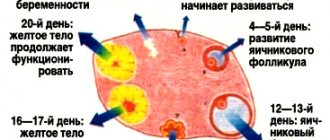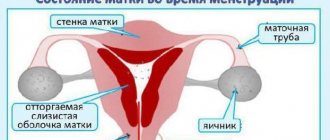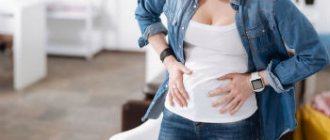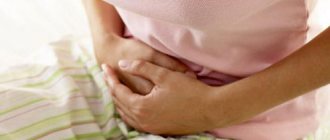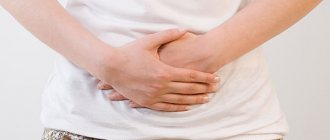Why does the uterus tingle?
Before the onset of menstruation, many women experience unpleasant, slightly painful feelings in the uterine area. Few people know that tingling can indicate the presence of a serious illness that requires urgent treatment. In some cases, a tingling sensation may occur not only in anticipation of menstruation, but also during it. Most often, this kind of violation may indicate the presence of the following diseases:
- Hormonal imbalances;
- Cervical erosions;
- Cyst;
- Inflammatory processes in the pelvic organs;
- Uterine fibroids.
Many women faced with this problem choose treatment using traditional methods, as well as using antispasmodics to relieve pain. However, you need to understand that if tingling in the uterine area does not go away for a long time, it is recommended to immediately visit a doctor. An accurate diagnosis can be made only after examination and passing the necessary tests. In this case, it will not be possible to independently determine why tingling occurs. During ovulation, a woman may experience a tingling sensation in the uterine area, but often the reason lies in a recent abortion or childbirth, as well as early pregnancy. Contacting a gynecologist allows you to determine the cause of unpleasant tingling sensations.
How to help yourself with PMS
Women most often use medications to treat premenstrual syndrome. For severe pain, they take potent drugs, which has a bad effect on the functions of the liver and kidneys.
It is worth trying to regularly use the knowledge of traditional medicine based on taking herbs and infusions. Some of them contain substances similar to estrogen, so they are able to normalize hormonal levels before and after menstruation.
Herbs that are recommended for use by women and girls:
- Nettle - contains a set of useful substances - vitamins, hemostatic substances. Has an anti-inflammatory effect, relieves menstrual pain. It is recommended to drink from the middle of the cycle until the end of menstruation.
- Oregano - used for delayed development of internal genital organs, as well as for pain in the lower abdomen.
Treatment with herbs should be carried out regularly, it is advisable to start the course of treatment before the onset of pain - 1 - 2 weeks before menstruation.
Many women experience such a phenomenon as tingling in the uterine cavity - this is how the body can signal the onset of pregnancy, or indicate the course of the disease. Although tingling is also typical for healthy women – we’ll talk about this later.
When else can the uterus tingle?
Tingling in the uterine area is a fairly common phenomenon that occurs at all stages of a woman’s life under the influence of various factors. Such sensations can be provoked by both diseases of the reproductive organs and pregnancy. It should also be taken into account that occasionally tingling sensations can occur in completely healthy women.
Unfortunately, most women let the situation take its course and take painkillers in the hope that the discomfort is a one-time occurrence. However, it should be borne in mind that such medications can only relieve pain, but do not in any way affect the cause of its occurrence. And with such actions the woman only aggravates the situation, allowing the disease to develop further unhindered. In some cases, the cost of neglecting one's own health turns out to be too high, for example, when chronic pathologies become the cause of infertility.
You can guess the probable cause of tingling in the uterus by analyzing at what period of the monthly cycle it usually occurs. Uncomfortable sensations may appear:
- before the start of menstruation;
- during menstruation;
- immediately after the end of menstruation;
- after ovulation;
- upon pregnancy.
How to relieve pain
Most women traditionally use antispasmodics to relieve pain when the uterus is in good shape during menstruation. This approach is not considered effective, since the action of the drugs is not directed at the cause of the pain. After some help, the pain returns again.
Instead, gynecologists recommend using anti-inflammatory painkillers. Some girls find regular Ibuprofen helpful, so there is no point in running around pharmacies looking for a medicine with a complex composition. Among nonsteroidal anti-inflammatory drugs (NSAIDs), you can take Ketanov, Nise, Tempalgin, Nurofen, Dexalgin.
Why does the uterus tingle during menstruation?
The appearance of pain in the lower abdomen is the most common complaint with which women consult a gynecologist.
If a woman experiences pain every month, a couple of days before the onset of menstruation, then it is highly likely that there are pathological changes in the reproductive organs. In this case, you should immediately contact a specialized specialist to conduct a gynecological examination and take the necessary tests. Regular pain may be a sign of the following dangerous diseases that require immediate treatment:
- endometriosis;
- oncological neoplasms;
- pyelonephritis;
- dysmenorrhea;
- cystitis and others.
Tingling in the lower abdomen is one of the characteristic signs of endometriosis, along with heavy menstrual bleeding, symptoms of anemia, and pain during sexual intercourse, urination or bowel movements.
Often, painful sensations in the lower abdomen also signal the development of an inflammatory process in the pelvic organs.
In this case, the woman complains of increased body temperature, chills, general weakness and malaise, pain during sexual intercourse, as well as pathological discharge from the genitals (bloody, purulent, serous, etc.).
Oncological tumors in the reproductive organs can be suspected if the following symptoms are combined:
- frequent inflammatory processes in the pelvic organs;
- purulent discharge with an unpleasant odor;
- painful, heavy menstruation;
- itching and discomfort in the genital area;
- intermenstrual discharge mixed with blood;
- frequent painful urge to urinate;
- contact discharge during sexual intercourse, douching, gynecological examination, etc.
It should be noted that the above symptoms are characteristic of an advanced stage of cancer; at the beginning, this disease can be completely asymptomatic, so it is extremely important to undergo regular examinations with a gynecologist.
If tingling occurs in the uterine area, it is permissible to take painkillers or sedatives before contacting a specialist. However, it should be remembered that this is only a temporary measure and has nothing to do with treatment. Only an examination by a gynecologist and a series of tests can identify the cause of the pain, on the basis of which treatment will be prescribed. And it’s no secret that diseases identified at the very beginning are easier to treat than those that have become chronic.
Tingling sensations in the uterus that occur with the onset of menstruation can signal the development of the following pathological conditions:
- hormonal imbalance;
- inflammation in the pelvic organs;
- cervical erosion;
- benign neoplasms (cysts, fibroids, etc.).
Relief of an acute attack of pain is allowed with the help of antispasmodic and analgesic drugs. However, it should be understood that none of the above problems go away on their own, so you cannot do without the help of a specialist. For example, if pain occurs due to a malfunction in the hormonal system, then a specialist may recommend taking hormonal medications as treatment, but with fibroids, even surgical intervention may be required.
Before menstruation, the right side or left lower abdomen hurts: causes, dangerous symptoms, treatment
Pain is often a sign of pathologies of internal organs, which especially concerns discomfort in the abdomen or side. However, sometimes unpleasant sensations can be a consequence of physiological processes. Why does the left or right lower abdomen hurt before menstruation, and what to do if such pain occurs too often?
Causes of pain in the side before menstruation
Tingling, cutting, aching sensations in the side before the onset of menstruation can be both non-pathological and pathological. In the first case, they are a consequence of physiological processes occurring in the internal genital organs, in the second, they indicate the presence of gynecological and non-gynecological ailments.
Non-pathological factors
At the beginning of the menstrual cycle, a dominant follicle is formed in one of the ovaries - right or left. The egg matures in it. In the middle of the month, 2 weeks before the start of the next menstruation, ovulation occurs. The wall of the dominant follicle bursts, releasing a small amount of blood, and the mature oocyte enters the fallopian tube.
Some women are highly sensitive and, on the eve of ovulation, during and after it, feel discomfort in the abdomen on the right or left. When the follicle wall ruptures, they feel a sharp cutting pain that radiates to the side in which the oocyte matured, but the discomfort quickly passes. In medicine, this phenomenon is called ovulatory syndrome.
Pathological processes
Pain may be associated with the following pathologies:
- Ovarian cyst. It can be follicular, when the dominant follicle does not burst during ovulation and continues to grow, and luteal, in which the corpus luteum does not regress at the end of the cycle. Small cysts go away on their own and do not require special treatment. Formations of significant size can cause pain during physical activity or sexual intercourse; rupture of the cyst is especially dangerous, which causes severe pain and leads to serious complications.
- Ovarian apoplexy is a rupture of the gland. Occurs due to injury or hormonal imbalance. Accompanied by stabbing pain in the side. The temperature rises, bleeding begins, and a febrile state occurs.
- Adnexitis is inflammation of the appendages. It is characterized by aching or sharp pain in the lower abdomen on the right or left, which radiates to the side and lower back. The pain intensifies before menstruation, and after it subsides a little.
- Ectopic pregnancy. If the attachment of the fertilized egg occurs in the fallopian tube or ovary, such a pregnancy is called ectopic. The woman has aching, pulling in the lower abdomen, a pain attack spreads to the right or left side, depending on the location of the pathology. Over time, the pain intensifies. If you do not go to the hospital in time, the pipe ruptures.
- Appendicitis. Pain in the side is not always associated with gynecological ailments. An acute attack may be a symptom of appendicitis - inflammation of the appendage of the cecum.
- Cholecystitis is inflammation of the gallbladder. The disease manifests itself as stabbing pain in the right side, which radiates to the stomach, lower back, and hypochondrium.
- Pancreatitis is inflammation of the pancreas. With pancreatitis, the left side hurts, problems with digestion appear, and stool is disrupted.
Pain of non-gynecological origin can appear at any time - both after and before menstruation. If it hurts just before menstruation, it can be either a coincidence or a consequence of increased uterine tone, which affects nearby organs.
Nature and location of pain before menstruation
The sensation is aching, pulling, and occasionally there may be a tingling sensation in the side. It usually hurts in the lower abdomen, closer to the left or right side. Sometimes it can radiate to the side or lower back.
What symptoms should you be wary of?
When should you see a doctor? Alarming symptoms:
- the pain lasts more than a day, medications do not help;
- severe attack - the pain is sharp and sharp;
- vaginal bleeding during periods when there should not be menstruation;
- increased body temperature;
- nausea and vomiting;
- general weakness, drowsiness, clouding of consciousness;
- digestive and defecation disorders.
How to get rid of unpleasant feelings?
If pain in the side and lower abdomen is periodic or too severe and causes significant discomfort, then first of all you should consult a gynecologist. The doctor will be able to determine whether such sensations are physiological or are symptoms of diseases.
If necessary, the following diagnostic methods are used:
- examination on a gynecological chair;
- Ultrasound;
- microflora smear;
- colposcopy.
Inflammation is treated with antibiotics. The cyst, as a rule, does not require specific treatment; it is monitored and removed if it begins to grow. If the cause of the pain is not gynecological in nature, the doctor will refer you to other specialists. The help of a urologist or gastroenterologist is often required. In case of exacerbation of appendicitis, rupture of a cyst or ovary, urgent surgery is performed.
How to get rid of discomfort caused by natural causes? Gynecologists prescribe combined oral contraceptives, which suppress ovulation and make menstruation less painful.
During an attack of pain, you can take an antispasmodic or analgesic, for example, No-shpu, Ibuprofen, Nurofen. To prevent pain during the premenstrual period, you should limit physical activity and exclude foods that cause excess gas from your diet.
Self-medication and taking medications without first consulting a doctor is strictly prohibited.
Source: https://www.OldLekar.ru/plan-beremennosti/mesyachnie/pered-mesyachnymi-bolit-pravyj-bok.html
If there is tingling in the uterus during ovulation, the reasons
The term ovulation refers to the process of the release of an egg into the fallopian tube as a result of the rupture of a mature follicle. Such an egg is completely ready for fertilization with subsequent implantation into the uterine wall. In healthy women, ovulation occurs in the middle of the monthly cycle, but there are situations when disturbances occur in this process:
- Abortion. In this case, malfunctions in the reproductive system are observed within three months after the procedure.
- Childbirth. Lead to disruption of egg production over the next 12 months.
- Age period. In women over 40 years of age, the number of anovulatory cycles increases significantly. In this way, the body prepares for the onset of menopause.
- Inflammatory diseases of the reproductive organs.
- Malfunctions of the adrenal cortex or thyroid gland.
- Regular stress, excessive nervous tension.
- Tumors of various etiologies in the pituitary gland or hypothalamus.
- Disruptions of the menstrual cycle.
Characteristic signs of the onset of ovulation are clear, mucous vaginal discharge, increased libido, a jump in basal temperature, etc. Currently, ovulation can be determined using special tests. Tingling sensations in the uterus at the time of ovulation can signal successful fertilization, which is subsequently confirmed by a positive pregnancy test.
Reviews
Reviews about tingling in the uterus:
✓ Article checked by doctor
Menstruation is the rejection of the functional layer of the endometrium lining the inner surface of the uterus, which has a certain cyclicity. Another name for menstruation is regula (from the word “regular”). The first day of menstruation is considered the beginning of the menstrual cycle - the period during which changes occur in the functioning of the reproductive organs, aimed at the possibility of conception. In a healthy woman, the cycle length is usually 28-30 days. These numbers are the classic norm, but for many women they can fluctuate depending on individual characteristics. Gynecologists consider the acceptable duration of the menstrual cycle to be from 25 to 34 days.
A few days before the start of the regimen, a woman’s health may worsen. Many people complain of increased weakness during this period, decreased performance, and constant drowsiness. Physiological sensations are also possible, for example, headaches, a slight increase in body temperature, and increased sweating. The most common complaint at the end of the menstrual cycle for most women is pain in the lower abdomen. Almost 60% of women of reproductive age experience this symptom. To understand whether this is normal or pathological, you need to know the possible causes of pain.
Lower abdomen hurts before menstruation
If there is tingling in the uterus during pregnancy
Every third woman experiences tingling in the uterine area during pregnancy. Most often, this feeling occurs in the first weeks of pregnancy. This occurs against the backdrop of numerous changes in the body that occur as a result of pregnancy. Throughout the entire period of pregnancy, intensive growth of the child is observed, which does not always lead to pleasant sensations in the lower abdomen. It should be noted that during pregnancy, tingling in the uterine area can be very different, and therefore their reasons may vary. To make sure your pregnancy is progressing normally, it is recommended to visit a gynecologist to make an accurate diagnosis.
When the woman describes the painful and tingling sensation, she compares it to a needle stick in the upper pubic area, with the sensation often extending to the perineal area. This kind of sensation can be observed during egg implantation; it is not so much painful as it makes you tense. Unpleasant sensations often occur closer to the night, when the woman completely relaxes and is susceptible to various types of physical activity.
If we talk about tingling in the uterus during pregnancy that is unnatural in nature, then we can include a stabbing sharp pain, against the background of which there are strong cramps, bloody discharge, and aching pain that resembles that which occurs in women before menstruation. Tingling of an unnatural type can cause severe discomfort, indicating that it is necessary to urgently consult a gynecologist. Otherwise, this phenomenon may cause a miscarriage.
Main signs before menstruation
Laboratory research methods provide the most accurate information about a woman’s condition. These methods are based on identifying specific substances in physiological fluids - markers of pregnancy, for example, human chorionic gonadotropin.
The most accessible way in our time is to use a special test that shows the level of concentration of the pregnancy hormone in the urine. To do this, you need to lower one test strip into a container with urine, then place it on a horizontal surface and see the result after 4-5 minutes. If the hormone level is sufficient, the test will show 2 bright stripes. It is better to perform this analysis in the morning, since at this time the concentration of human chorionic gonadotropin (hCG) in the urine will be highest.
A more reliable test is a blood test for hCG. Human chorionic gonadotropin will be detected in a much higher concentration in the blood of a pregnant woman immediately after implantation of the embryo into the uterine wall.
With manual and visual examination, a gynecologist can determine slight pallor of the vaginal walls, loosening and changes in the shape and size of the uterus. This will also allow you to suspect pregnancy.
In any case, after a delay of 3-7 days in the menstrual cycle, you need to go for an ultrasound to make sure that the fertilized egg is properly attached, and go to the gynecologist to prescribe the necessary vitamins and register.
Easy pregnancy and childbirth!
Unpleasant sensations associated with the onset of menstruation can be very individual. However, the most common period symptoms are:
- pain in the lower back, abdomen, chest;
- depressive mood combined with sleep disturbances;
- headache.
If you compare the symptoms of menstruation with the first signs of pregnancy, you can come to the conclusion that they are very similar. In the early stages of pregnancy, a woman may be drowsy, irritable, and have sudden mood swings. To understand the manifestations of the body, you need to learn to listen to yourself and feel changes.
Watch yourself for a few months. If the symptoms before your period are headaches and back pain, then it is likely that these symptoms will not bother you once you become pregnant. If, on the contrary, the signs of the onset of menstruation are unknown to you, then you can say with reasonable confidence that pregnancy has occurred if you suffer from migraines, excessive irritability, and mood swings.
Why does the uterus tingle during pregnancy, reasons
One of the first signs of successful fertilization is a tingling sensation in the uterine area.
In addition, women who carefully monitor their own health may notice other changes that signal pregnancy. These include:
- Spotting vaginal discharge after ovulation. This is the so-called implantation bleeding, which occurs during the implantation of a fertilized egg into the wall of the uterus. This sign of pregnancy is reliable if the woman does not experience disruptions in her monthly cycle, there is no erosion of the cervix and other pathologies of the pelvic organs.
- Apathy, weakness, drowsiness. However, such sensations in themselves do not indicate the onset of pregnancy, because they can also signal other disorders in the body, for example, an acute respiratory viral infection.
- Pulling or stabbing sensation in the lower abdomen. Similar symptoms can occur from the moment of fertilization and the cause of this condition is a change in hormonal levels, increased blood flow in the pelvic cavity and growth of the uterus.
- Cutting pain in the abdomen combined with bloody discharge can be a sign of an ectopic pregnancy. This condition is extremely dangerous, since failure to provide timely medical care can lead to death. In addition, these symptoms in the early stages may signal spontaneous termination of pregnancy.
- Nausea, vomiting. Many are accustomed to the fact that such signs are manifestations of early toxicosis, but changes in the position of the appendages can also provoke such sensations.
In general, the causes of colic in the lower abdomen are a sign of restructuring of the female body as a result of preparation for the upcoming birth. However, only the attending physician can accurately determine the exact cause based on the examination and test results. Remember, early diagnosis of pathologies will help protect the life and health of both the expectant mother and the baby.
Source: womanchoise.ru
Similar articles
- Bleeding before and after menstruation: reasons, how to treat Spotting blood before and after menstruation If spotting blood from the vagina occurs during the menstrual cycle, then this is a completely normal process. But, if this happens before and or after menstruation, then such...
- Pain during menstruation: causes, what to do Nagging pain in the lumbar region and lower abdomen, breast swelling and increased sensitivity, bowel disorder in the form of diarrhea are frequent companions of menstruation. As survey results show, every second person experiences these symptoms...
- Menstruation 6, 7, 8, 9 days, reasons for long periods, what to do The structure of the reproductive system of every woman is very complex and a failure in its functioning can be influenced by a fairly large number of various factors. Therefore, to answer the question why periods last 7, 8 or even 9...
Alarming symptoms
The following symptoms should not be ignored:
- Heavy bleeding during menstruation. This may indicate the presence of tumors, including malignant ones, endometriosis, and bleeding polyps. As a result of regular blood loss, anemia can develop, and this is a problem for the whole body.
- Nagging pain in the lower abdomen before menstruation can be a sign of an ectopic pregnancy if there was unprotected intercourse during ovulation, or the woman is planning a pregnancy. It is necessary to do an hCG test or verify the presence of an embryo using ultrasound. The device will show whether the zygote is located correctly or whether surgical intervention is required.
- After an abortion, problems with menstruation may occur. If artificial termination of pregnancy is carried out in unsanitary conditions, it causes infection of the peritoneum, which leads to its inflammation. In this case, it is necessary to carry out abdominal surgery and a number of measures to relieve symptoms of intoxication. At the first signs you should consult a doctor.
- Even at a young age, cases of cervical cancer occur. One of the first symptoms is pain after sexual intercourse and spotting. If this happens, you need to be examined by a doctor or donate blood for tumor markers in any specialized laboratory.
Stomach hurts before menstruation, but menstruation has not occurred
The most likely cause of pain during this period in the absence of further menstruation is pregnancy. To diagnose pregnancy, you can use home tests in the form of strips with a reagent applied to them or laboratory methods (determining the level of hCG in the blood and urine). A doctor can diagnose pregnancy using a transvaginal ultrasound, but you should know that this method is quite traumatic and in the early stages can cause termination of pregnancy.
Pain in the lower abdomen before menstruation is a fairly common problem that almost all women face. In most cases, pain syndrome is the result of physiological processes that occur in the body during the menstrual cycle, but sometimes serious illnesses can cause similar symptoms, so if you have regular pain during this period, you should not postpone a visit to the gynecologist.
| Cervical | Cervix |
| Intermuscular | Muscular layer of the uterine walls |
| Submucosa | Closer to the uterine cavity, in rare cases may be lowered into the vaginal tract or cervix |
| Interligamentous | Lower lateral rib of the uterus |
| Subperitoneal | The outer side of the uterus, which extends into the beginning of the peritoneal space |
Causes of pain before menstruation
When there is colitis in the uterus before the onset of menstruation, you should pay attention to the level of hormones in the blood. Changes in hormonal levels are considered a sign of unpleasant sensations; they bother you for a certain period of time and occur a few days before the onset of monthly bleeding.
How to recognize pathology?
- the pain is long-lasting, occurs several days before the start of menstruation and continues after its completion;
- menstrual bleeding is prolonged and heavy;
- colic in the uterus is pronounced, they are cramping in nature and intensify when lifting heavy objects.
Symptoms appear during and after menstruation
The uterus hurts after menstruation due to a hormonal imbalance in the body. The level of hormones in the blood rose sharply and then decreased. As a result, unpleasant discomfort arose in the intimate area.
Tingling in the uterus before menstruation also appears against the background of an increase in the level of hormones in the blood. But these unpleasant sensations quickly pass. As soon as the level of hubbub stabilizes.
If this does not happen, then it’s time to see a doctor and take a hormone profile. Instability of hormonal levels can occur due to:
- Taking oral contraceptives.
- A recent abortion (no more than 1 year has passed since the procedure).
- The fact that not long ago a woman gave birth to a child (no more than 6 months have passed since the birth).
- A recent miscarriage (at least 6 months after the miscarriage occurred).
All of the above conditions lead to changes in the level of hormones in the blood. The body will need some time to recover. When the hormonal levels stabilize, the tingling will disappear.
If the discomfort does not disappear, the symptoms continue to increase, then it is necessary to urgently visit a gynecologist, since only he will be able to determine exactly why the pain occurred.
When should you see a doctor?
Regarding the question of when to visit a doctor, doctors unanimously say that if there is a deviation from the norm:
- When tingling in the uterus bothers you for more than a day,
- Bloody or purulent vaginal discharge appears,
- Body temperature rises and chills bother you.
This is especially true for pregnant women, when any change in the body and negative impact can provoke spontaneous miscarriage, intrauterine fetal death and premature birth.
Timely assistance from doctors and the attention of specialists, taking prompt measures will help preserve the life and health of mother and child.
In all other respects, the main thing is to follow the doctor’s instructions and lead a healthy lifestyle, which will have a beneficial effect on the entire body, the health of the woman and her future children.
